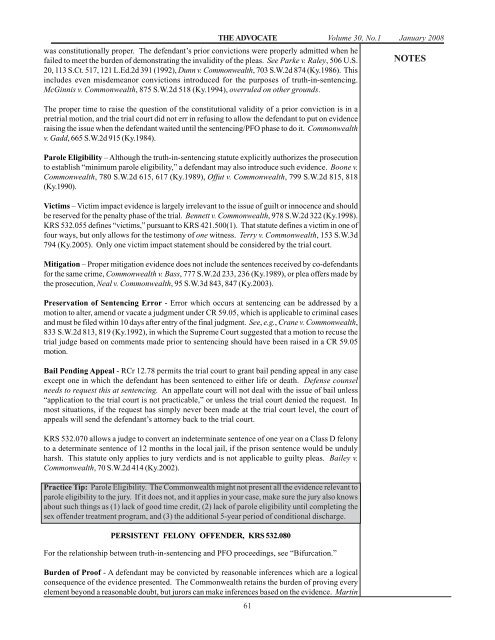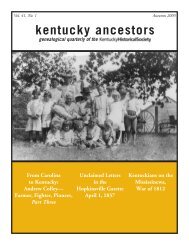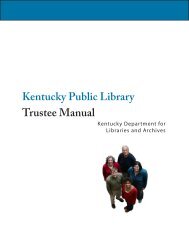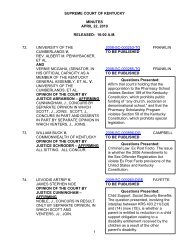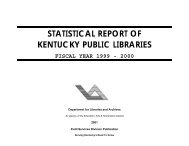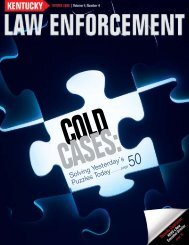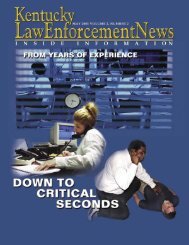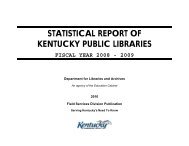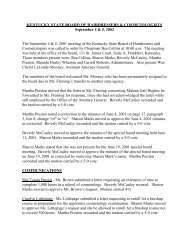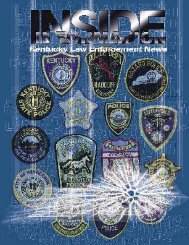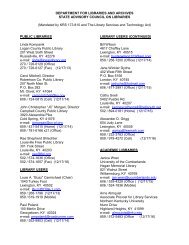Jan08 Advo.pmd - e-archives Home
Jan08 Advo.pmd - e-archives Home
Jan08 Advo.pmd - e-archives Home
Create successful ePaper yourself
Turn your PDF publications into a flip-book with our unique Google optimized e-Paper software.
THE ADVOCATE Volume 30, No.1 January 2008<br />
was constitutionally proper. The defendant’s prior convictions were properly admitted when he<br />
failed to meet the burden of demonstrating the invalidity of the pleas. See Parke v. Raley, 506 U.S.<br />
20, 113 S.Ct. 517, 121 L.Ed.2d 391 (1992), Dunn v. Commonwealth, 703 S.W.2d 874 (Ky.1986). This<br />
includes even misdemeanor convictions introduced for the purposes of truth-in-sentencing.<br />
McGinnis v. Commonwealth, 875 S.W.2d 518 (Ky.1994), overruled on other grounds.<br />
The proper time to raise the question of the constitutional validity of a prior conviction is in a<br />
pretrial motion, and the trial court did not err in refusing to allow the defendant to put on evidence<br />
raising the issue when the defendant waited until the sentencing/PFO phase to do it. Commonwealth<br />
v. Gadd, 665 S.W.2d 915 (Ky.1984).<br />
Parole Eligibility – Although the truth-in-sentencing statute explicitly authorizes the prosecution<br />
to establish “minimum parole eligibility,” a defendant may also introduce such evidence. Boone v.<br />
Commonwealth, 780 S.W.2d 615, 617 (Ky.1989), Offut v. Commonwealth, 799 S.W.2d 815, 818<br />
(Ky.1990).<br />
Victims – Victim impact evidence is largely irrelevant to the issue of guilt or innocence and should<br />
be reserved for the penalty phase of the trial. Bennett v. Commonwealth, 978 S.W.2d 322 (Ky.1998).<br />
KRS 532.055 defines “victims,” pursuant to KRS 421.500(1). That statute defines a victim in one of<br />
four ways, but only allows for the testimony of one witness. Terry v. Commonwealth, 153 S.W.3d<br />
794 (Ky.2005). Only one victim impact statement should be considered by the trial court.<br />
Mitigation – Proper mitigation evidence does not include the sentences received by co-defendants<br />
for the same crime, Commonwealth v. Bass, 777 S.W.2d 233, 236 (Ky.1989), or plea offers made by<br />
the prosecution, Neal v. Commonwealth, 95 S.W.3d 843, 847 (Ky.2003).<br />
Preservation of Sentencing Error - Error which occurs at sentencing can be addressed by a<br />
motion to alter, amend or vacate a judgment under CR 59.05, which is applicable to criminal cases<br />
and must be filed within 10 days after entry of the final judgment. See, e.g., Crane v. Commonwealth,<br />
833 S.W.2d 813, 819 (Ky.1992), in which the Supreme Court suggested that a motion to recuse the<br />
trial judge based on comments made prior to sentencing should have been raised in a CR 59.05<br />
motion.<br />
Bail Pending Appeal - RCr 12.78 permits the trial court to grant bail pending appeal in any case<br />
except one in which the defendant has been sentenced to either life or death. Defense counsel<br />
needs to request this at sentencing. An appellate court will not deal with the issue of bail unless<br />
“application to the trial court is not practicable,” or unless the trial court denied the request. In<br />
most situations, if the request has simply never been made at the trial court level, the court of<br />
appeals will send the defendant’s attorney back to the trial court.<br />
KRS 532.070 allows a judge to convert an indeterminate sentence of one year on a Class D felony<br />
to a determinate sentence of 12 months in the local jail, if the prison sentence would be unduly<br />
harsh. This statute only applies to jury verdicts and is not applicable to guilty pleas. Bailey v.<br />
Commonwealth, 70 S.W.2d 414 (Ky.2002).<br />
Practice Tip: Parole Eligibility. The Commonwealth might not present all the evidence relevant to<br />
parole eligibility to the jury. If it does not, and it applies in your case, make sure the jury also knows<br />
about such things as (1) lack of good time credit, (2) lack of parole eligibility until completing the<br />
sex offender treatment program, and (3) the additional 5-year period of conditional discharge.<br />
PERSISTENT FELONY OFFENDER, KRS 532.080<br />
For the relationship between truth-in-sentencing and PFO proceedings, see “Bifurcation.”<br />
Burden of Proof - A defendant may be convicted by reasonable inferences which are a logical<br />
consequence of the evidence presented. The Commonwealth retains the burden of proving every<br />
element beyond a reasonable doubt, but jurors can make inferences based on the evidence. Martin<br />
61<br />
NOTES


